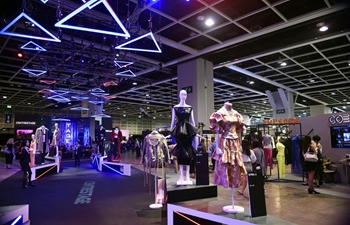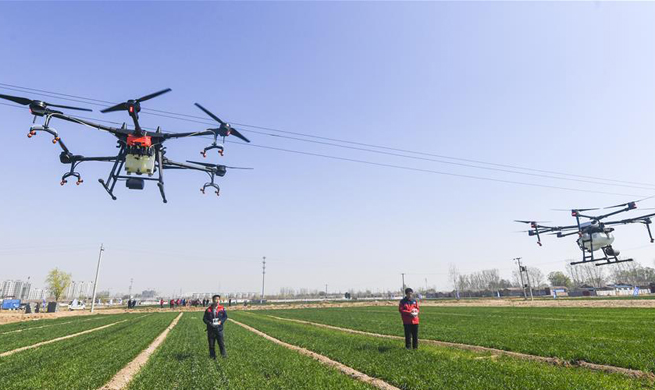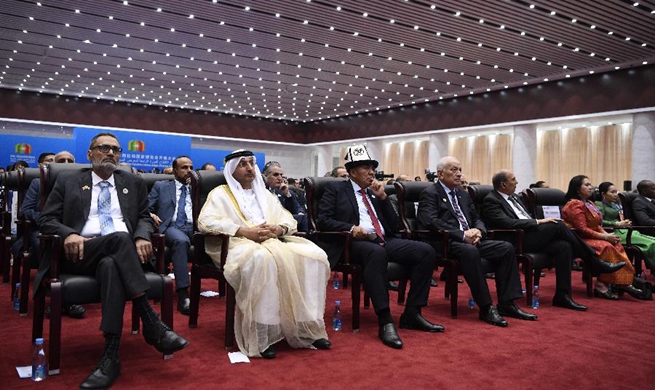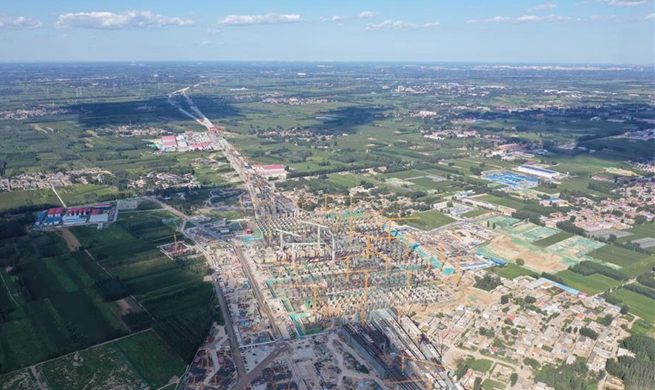by Julius Abraham and Stephanie Wolff
BERLIN, Sept. 6 (Xinhua) -- The international motor show IAA will kick off next week in Frankfurt, once again bringing together fans of the automotive world awaiting exciting innovations and new developments, and the international car manufacturers who will try and deliver on these expectations.
However, the fair is suffering from cancellations from many important car manufacturers, an outdated concept as well as headwind and protests from environmental groups.
This year, major luxury names like Aston Martin, Ferrari and Rolls-Royce will be missing from the automotive show. Other large household names from across the automotive and geographical world will also not be attending, including Chevrolet, Fiat, Jeep, Mazda, Nissan, Peugeot, Toyota and Volvo.
At the same time, while many Western carmakers would not attend this year's IAA, Chinese manufacturers "are in the process of establishing and expanding connections to Germany," Ferdinand Dudenhoeffer, automotive expert at the German CAR Institute, told Xinhua.
Despite Chinese attendance, such as the electric car start-up Byton and Great Wall with the Wey brand, the appeal of the trade fair has been on the decline. When the car show was last held in 2017, it attracted around 1,000 exhibitors, this time there will only be around 800 exhibitors.
These numbers would reflect a trend "traditional motor shows are losing importance worldwide, as customer demands have changed rapidly," Stefan Bratzel, director of the Center of Automotive Management (CAM), told Xinhua.
Car manufacturers had "many better and cheaper platforms" to present their new cars and concepts, according to Bratzel. Large car manufacturers could organize their own "in-house exhibitions" or showcase their new vehicles to journalists in advance, for example.
Already at the last IAA in 2017, the number of visitors had declined to 810,000, a significant drop compared to the roughly 932,000 visitors who attended the previous fair in 2015.
And while it is true that the IAA, which took place for the first time in 1897, is one of the oldest and currently still one of the largest automotive trade fairs in the world, its global importance is fading.
The IAA automotive fair was suffering from the "rapid loss of attractiveness of the classic analogue car fairs as well as the high costs of the trade fair appearances with a negligible marketing effect", said Dudenhoeffer.
Automotive trade fairs needed much more than just "stationary cars" to attract people, added Dudenhoeffer who pointed to "young trade fairs" such as the video game fair Gamescom as an example for a well-functioning fair.
"Trade fairs can therefore work if they have the right concept," Dudenhoeffer stated, but the disparity between the Germans' love for their cars and the current problems at the IAA made it clear that Germany's largest automotive trade fair lacked a "brilliant idea for the future".
As if all these were not enough, the car show increasingly looks to be out of touch with public and political concerns over climate change. Several groups of climate activists have announced their intentions to stage protests at the IAA in Frankfurt.
One of the groups which calls itself Rocks in the Gearbox described the IAA fair in Frankfurt as "a propaganda show where the outmoded, climate and environment destroying transportation system is hyped".
In an effort to defuse the anti-car sentiment ahead of the IAA, the German auto industry association VDA had invited environmental activists from Greenpeace as well as German Environmental Action (DUH) to a panel discussion with executives from Daimler and BMW to debate the climate crisis and mobility of the future.
Although the organizers have described the IAA as a "leading future platform for mobility topics", the extent to which the 2019 IAA will address environmental concerns remains open, especially given the prominence of SUV models that will be presented by the remaining exhibitors at this year's fair.
Stigmatized as heavy fuel consumers, SUVs have garnered much criticism from many politicians and environmental groups, especially as they are currently witnessing a sales boom in Germany where they accounted for 31 percent of all new car registrations in the first half of 2019.
Friends of the Earth Germany has described SUVs as "too heavy, too large, and thus fundamentally inefficient, threatening all the social goals that have been set".
German politicians from several parties have demanded that something be done about the increase of SUVs while the Federal Environment Agency (UBA) wants vehicles with high CO2 emissions to become more expensive.
German Green Party transport politician Stephan Kuehn went so far as to say that "car manufacturers who focus their portfolios on such climate killers are torpedoing climate protection".
Carmakers presenting their larger, more powerful and more CO2 intensive vehicles appear to be at odds with the current societal debates in Germany, which appears to be one of the major drains on the attraction of the IAA.
"Bringing climate change into balance with individual mobility is the major challenge," concluded German CAR expert Dudenhoeffer. If the IAA cannot join them together in a meaningful and socially responsible way, its entire foundation appears uncertain, or at least, will be up for discussion.













